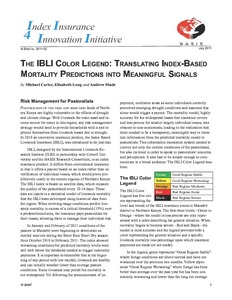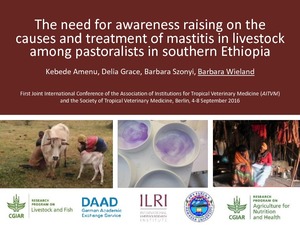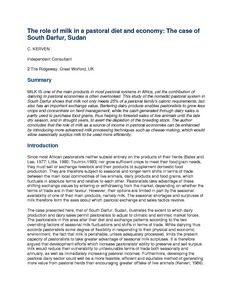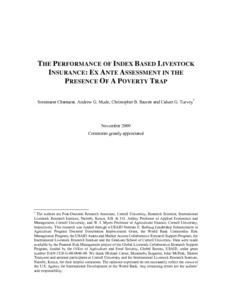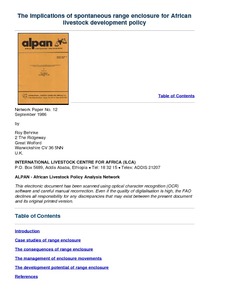The Kenyan rangeland ecological monitoring unit (KREMU)
Discusses the Kenya Rangeland Ecological Monitoring Unit (KREMU), mentioning its objectives, initial tasks related to identifying ecological units, testing survey methods, training of staff & designing appropriate computer programmes; describes the Unit's achievements, with emphasis on ecological surveys & censuses carried out within the framework of on-going ecological monitoring programmes; outlines problems encountered.
The productivity of small ruminants in the Maasai pastoral system, Kajiado District, Kenya. An introduction to current research
Describes the research approach adopted by an interdisciplinary ILCA team to study a pastoralist production system, summarizing the methodology & results of research on small ruminants' productivity in the Maasai pastoral system, and outlining dif. features of current smallstock research in Kenya; w. an analysis of flock productivity, mortality, animal nutrition & behaviour at the Elangata Wuas group ranch.
The linkages between land use change, land degradation and biodiversity across East Africa
Land use changes in East Africa have transformed land cover to farmlands, grazing lands, human settlements and urban centers at the expense of natural vegetation. These changes are associated with deforestation, biodiversity loss and land degradation. A synthesis of results of long term research by an interdisciplinary team reveals the linkages between land use change, biodiversity loss and land degradation. The results indicate that as native vegetation is lost, indigenous plant and animal biodiversity and plant cover are lost.
The role of abandoned pastoral settlements in the dynamics of African large herbivore communities
A number of studies have begun to show the large impact that pastoralism has on African savanna ecosystems. Here we look at the impact of abandoned settlements on the distribution of the large ungulates of Amboseli, Kenya.
Monthly dung counts show that all 9 species studied are attracted by settlements for up to a century after abandonment.
The need for awareness raising on the causes and treatment of mastitis in livestock among pastoralists in southern Ethiopia
Ethiopia has high prevalence of clinical and subclinical mastitis in different livestock
species and production systems and these contribute substantially to poor
productivity in affected herds. Thus far, studies have focused on identification of
microbial pathogens and associated risk factors for mastitis. However, relatively little
is known about the knowledge and beliefs of livestock keepers regarding prevailing
livestock health problems in general and mastitis in particular. An accurate
The role of milk in a pastoral diet and economy: The case of South Darfur, Sudan
Describes the characteristics of dairy production and processing in South Darfur and provides an analysis of the way in which pastoral families vary their diets according to seasonal food shortages and shifting terms of trade between milk and food grains.
The performance of index based livestock insurance: ex ante assessment in the presence of a poverty trap
This paper evaluates the effectiveness of a new index-based livestock insurance (IBLI)
product designed to compensate for area average predicted livestock mortality loss in
northern Kenya, where previous work has established the presence of poverty traps. We
simulate household-specific wealth dynamics based on a model parameterized using rich
panel and experimental data from the region. The simulations allow us to investigate
patterns of willingness to pay for asset index insurance that is imperfectly correlated with
The implications of spontaneous range enclosure for African livestock development policy
This paper examines a process - the spontaneous enclosure of the range by livestock owners - which may rise new problems but also permit new approaches to the development of the African livestock industry. Drawing on case material from Sudan and Somalia, the opening section of the paper discusses some of the spontaneous range enclosure.

